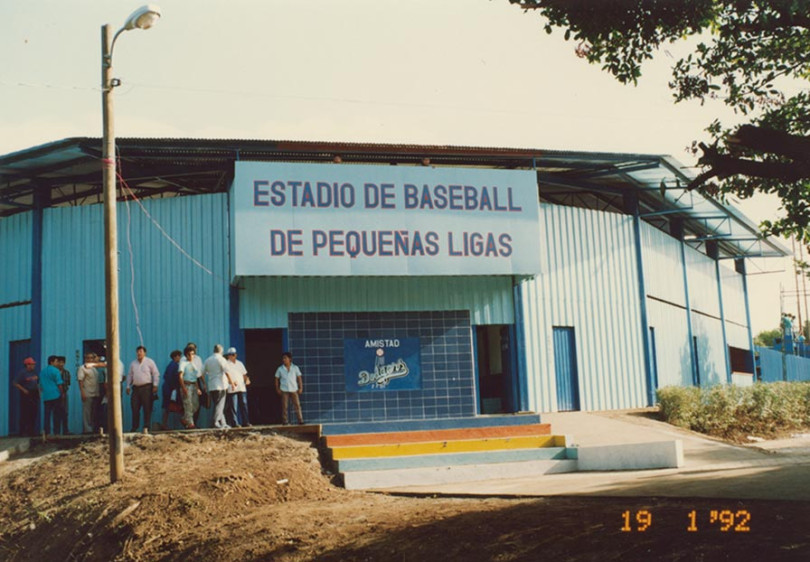
The entrance to Dodgers Little League Friendship Field (also known as Amistad Dodgers) in Managua, Nicaragua as dedication ceremonies were on January 18, 1992. Dodger President Peter O’Malley privately built the 3,000-seat small stadium, which was painted blue in honor of the Dodgers. The President of Nicaragua, Violeta Barrios de Chamorro, participated in the Grand Opening festivities.
Baseball Field in Nicaragua Celebrated as Life-Changing for Youth
By Brent Shyer
As the friendship between Dodger President Peter O’Malley and Nicaraguan international baseball leader Carlos Garcia grew starting in the 1970s, O’Malley was interested in the development of baseball in that country. “I was impressed with Carlos’ vision,” said O’Malley. “Over the years, we talked about baseball in Nicaragua and the idea developed to build a youth field.”
As Nicaraguan Minister of Sports Carlos Garcia explained upon the field’s opening on January 18, 1992, “Among the orientations that Nicaragua President Mrs. Violeta Barrios de Chamorro has given us, and which we have emphasized by Minister of the Presidency Antonio Lacayo, are the promotion and development in a special manner of sports programs for the children and youth of Nicaragua, not only for being the great alternative against vices and drug addiction, but because such programs contribute to the forging of the good character of the men and women of the future. In our effort to accomplish this job, we talked to our great friend and philanthropist, who has helped us many times, Mr. Peter O’Malley, who gave us an almost immediate response, for the construction of a Little League Baseball Stadium to benefit the children of Nicaragua.”
A lifelong baseball fan, Carlos J. Garcia Solorzano was born in Managua on April 30, 1931 and graduated from the Military Academy of Nicaragua as a first lieutenant in combat engineering. He continued his studies in the United States at Northwestern and Texas A&M, as well as in investigative studies for the police in Peru, before working for the Secret Service in the U.S. Treasury Department. Lou Pavlovich, Collegiate Baseball, April 19, 1985 Es.m.wikipedia.org, Carlos Garcia Solorzano, 2020 In Nicaragua, Garcia became a successful business leader, working as president of the Nicaraguan Association of Port and Customhouse Agencies and as a leader in other companies involving custom brokers, steamship lines and warehousing.
However, it was his passion for baseball that led him to help advance the game in Nicaragua. Garcia founded the Little Leagues of Nicaragua, aligning them with Williamsport, PA. He also founded the Nicaraguan Olympic Committee in 1959, after organizing federations for six sports. And, after the demise of the Nicaraguan professional baseball league in 1967, it was Garcia again who started amateur baseball with a league in 1970 and was president of the Nicaraguan Federation of Amateur Baseball. At age 26, Garcia became the youngest representative elected to the international baseball governing body Federacion Internacional Beisbol Amateur (FIBA). Lou Pavlovich, Collegiate Baseball, April 19, 1985 Garcia had one goal – to secure a spot in the Olympic Games for baseball. He would lobby International Olympic Committee (IOC) leaders and ask for their support for baseball. But, there was a second international baseball organization that started September 8, 1973 called Federacion Mundial de Beisbol Amateur (FEMBA) and it was led by Dutch Fehring, longtime U.S. college baseball coach at Stanford and Purdue. When Fehring left the presidency, it was Garcia who was elected president in 1975. But, only FIBA was recognized by the IOC, so by 1976 a merger of the two organizations took place and a new name was established called the Associacion International Beisbol Amateur (AINBA).
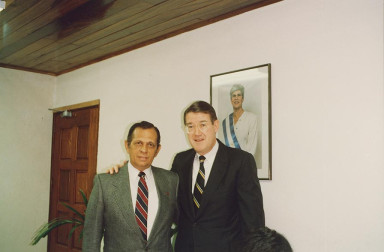
Carlos Garcia, longtime international baseball leader and President, Nicaraguan Baseball Federation, with Dodger President Peter O’Malley and a portrait of Nicaragua President Violeta Barrios de Chamorro behind them. O’Malley was a guest of the Nicaraguan Sports Institute and visited Managua from October 30-November 2, 1990. Garcia was the Vice Minister at that time and also served as the secretary general of the Nicaraguan Olympic Committee.
Garcia’s presidency with FEMBA was concluded when the new AINBA was organized, but he was still elected as Executive Vice President, while Cuba’s Manuel Gonzalez Guerra was elected president. When AINBA was invited to an important Extraordinary Baseball Congress, organized and hosted by Peter O’Malley and the Dodgers on September 10-12, 1979, Garcia was there and was popular. He was one of nearly 100 representatives who attended the meetings and visited Dodger Stadium for games. At that meeting, the goal was to establish baseball as a demonstration sport in the 1984 Games of the XXIII Olympiad in Los Angeles, with a long-term view of obtaining official medal status in the Olympic Games by gaining support of countries around the world to encourage the IOC to vote in favor.
A newly-formed Olympic Baseball committee for AINBA was announced including United States Baseball Federation President Dr. Bob Smith; Peter O’Malley; University of Southern California Head Baseball Coach Rod Dedeaux; and Major League Baseball Commissioner Bowie Kuhn in an honorary role to advocate for baseball in the Olympic Games. Garcia and others were on the committee. On December 21, 1979, Garcia inscribed in his just released “Baseball Forever” book and sent it to O’Malley stating, “To Peter O’Malley: With a dozen of men like you, Baseball would not only become an Olympic Sport, but it would help in the solution of many problems that would guide us to a happier world. May God bless you and our DODGERS!” By 1980, momentum was starting to increase as the Olympic Baseball committee was preparing to make a full-court press to the Los Angeles Olympic Organizing Committee (LAOOC) and IOC to become one of two demonstration sports.
On May 11, 1980, Garcia was preparing for a routine business trip to Asia from the Managua, Nicaragua airport, he was abruptly taken into custody, accused of treason and arrested. “Baseball Beyond Our Borders: An International Pastime,” edited by George Gmelch, Daniel A. Nathan, 2017 Lou Pavlovich, Collegiate Baseball, April 19, 1985 It was just a brief time after the government of Anastasio Somoza had been overthrown by the Sandinistas and the Sandinistas came right after Garcia.
“I never belonged to any political party, but the Sandinistas said the CIA wanted to control international baseball,” said Garcia. Baseball-reference.com, Carlos Garcia (Nicaragua) According to Dr. Smith’s remembrance, Garcia was sentenced to 10 years in a Nicaraguan prison, charged with “being a leader of a Contra movement to overthrow the Communist Sandinista Nicaraguan government.” Dr. Bob Smith, Olympic Baseball Timeline, 2019 No trial was ever afforded to Garcia and he was isolated from other prisoners, sometimes going three to five days without being provided with food. Lou Pavlovich, Collegiate Baseball, April 19, 1985
Garcia recalled, “My job, my property were lost. It was like a grenade exploded and shattered Nicaragua into a thousand pieces.” Baseball-reference.com, Carlos Garcia (Nicaragua)
Tireless efforts by friends and governments – as far reaching as Mexico, Ecuador, the United States and Brazil – attempting to pressure Nicaraguan officials to release Garcia for false imprisonment at the time proved fruitless.
At the fall, 1980 meeting of AINBA in Tokyo, the discussion of who would be the next president of the organization topped the list of business. It was a critical vote, as the leader would have to navigate the challenges associated with baseball in the Olympic Games, while continuing to lobby IOC members around the world. It was the common belief up until May that Garcia would be the front-runner for that position. But, with the sudden and stunning turn of events, baseball leaders would have to deal with the uncertainty of his future.
In a vote of support for their popular colleague, Garcia was elected president of AINBA. However, a large contingent felt that Dr. Bob Smith of the United States would be able to lead the group though the storm better than anyone else. Dr. Smith was elected as Vice President, but asked to become acting president during Garcia’s confinement. For the good of the cause, Dr. Smith, then wearing multiple hats, agreed. Meanwhile, Garcia’s health was deteriorating, as he was losing weight and stamina. He never wavered in his determination to help baseball, seeing it as a unifier of people and nations, no matter what the circumstances.
While others, including the IOC itself, tried to come to Garcia’s aid, he sat in prison and waited, fighting off illnesses as years went by. At the AINBA meeting in Canada in 1981, Dr. Smith was made the organization’s president after it was clear that Garcia would not be freed anytime soon.
On April 10, 1981, the LAOOC and IOC announced that baseball and tennis were added to the 1984 Olympics. Louis B. Fleming, Los Angeles Times, April 11, 1981 That news, like the rest of the international baseball family, would have made Garcia extremely proud, except he still had years of incarceration to go.
Peter O’Malley was heavily involved in the years of planning and preparation for the 1984 Olympic Baseball exhibition tournament at Dodger Stadium. He pledged to guarantee its financial success and heavily publicized the event. The tournament proved to be a showcase of eight teams in two divisions. The participants of the white division were Chinese Taipei, the Dominican Republic, Italy and the USA. In the blue division, the teams were from Canada, Japan, Korea and Nicaragua. Each team played the other three teams in their division, with the top two teams in each division advancing to the semifinals.
How ironic that Garcia, the man who started and encouraged youth and amateur baseball, was locked up while the Nicaraguan Olympic Baseball team made its way to Los Angeles for the competition. Nicaragua had won the silver medal at the 1983 Pan American Games, but it finished with a 1-2 record in Los Angeles. On August 7, 1984, a sellout crowd watched Japan win the finals against the USA to open the eyes of the world that international baseball competition was indeed making major strides.
Some 11 weeks later, October 26, 1984, the Sandinistas under pressure from a large worldwide community suddenly released Garcia after 1,640 days of captivity. Garcia was taken to a private hospital in Nicaragua and then transferred to Miami to try to get his health and strength back. After gaining back normal weight, he began lecturing to classes and groups in the U.S. about human rights violations and his experience. Garcia was invited by U.S. President Ronald Reagan to the White House for a briefing of Central American leaders on March 25, 1985. Baseball-reference.com, Carlos Garcia (Nicaragua)
But baseball was on his mind. “My first love, as always, is to see baseball become a permanent medal sport in the Olympics,” he said in April, 1985. “The day that sportsmen rule our various countries, instead of politicians, peace and freedom will prevail.” Lou Pavlovich, Collegiate Baseball, April 19, 1985
Garcia did get back to helping baseball. “I have my life to lead,” he said in 1985. “I’ve talked to a lot of people, including Peter O’Malley of the Dodgers, an old friend, Bob Smith and others. I’m now 52.” Ibid. But he was still a Nicaraguan living in exile in Miami. Garcia started a new amateur baseball league, Liga Nica (or Nicaraguan National League in Exile) for Nicaraguan Americans living in the U.S. in cities like Los Angeles, San Francisco, Houston, New York, and Miami. “Baseball Beyond Our Borders: An International Pastime,” edited by George Gmelch, Daniel A. Nathan, 2017
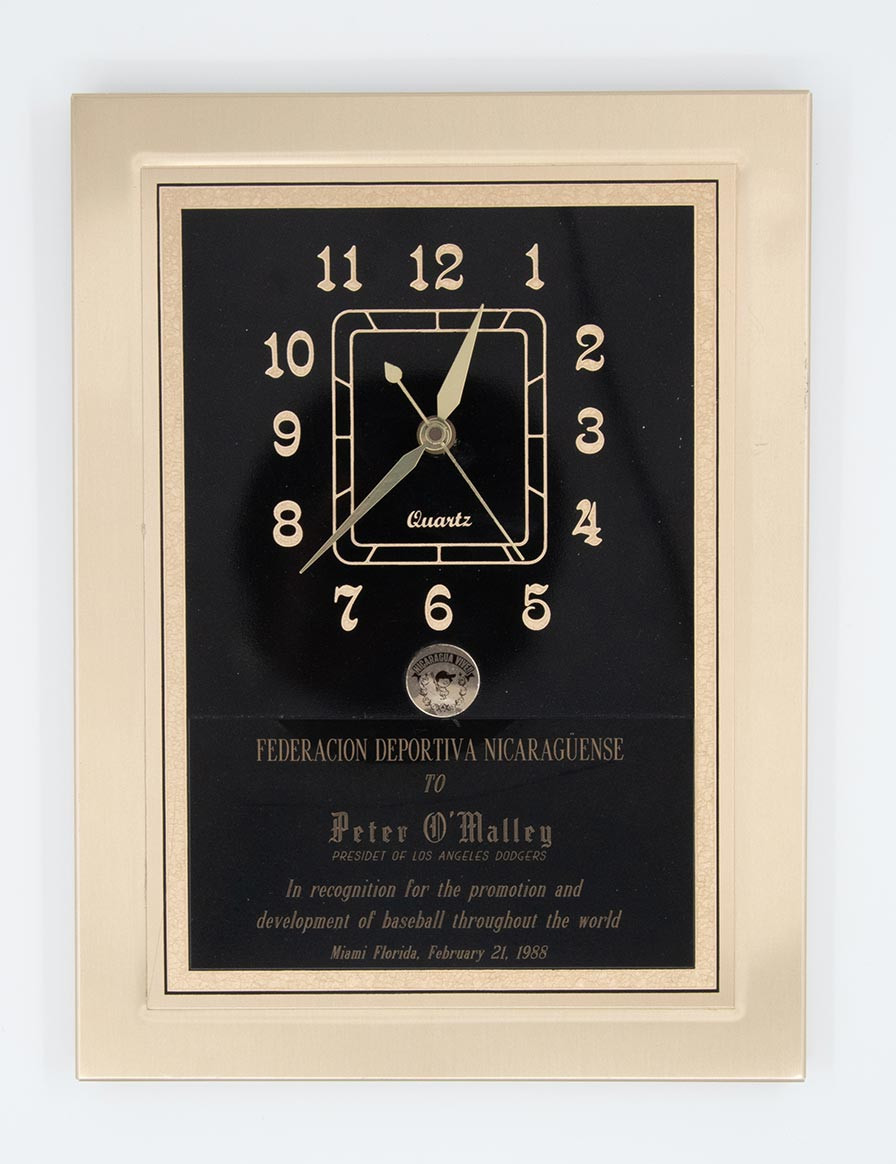
Dodger President Peter O’Malley receives this clock plaque for his assistance in helping to develop and grow baseball internationally on February 21, 1988 from the Nicaragua Sports Federation. O’Malley privately built a Little League Friendship Field in Managua, Nicaragua in 1992.
With the momentum from the artistic and financial success of Olympic Baseball in Los Angeles and more hard work by Dr. Smith, O’Malley, Dedeaux and Kuhn and others, the IOC announced on October 13, 1986 that baseball had received official status as an Olympic sport for the 1992 Barcelona Games. It was a day for international baseball leaders to celebrate, as their years of advocating the sport had finally reaped rewards. Everyone was grateful and excited about the future of international baseball.
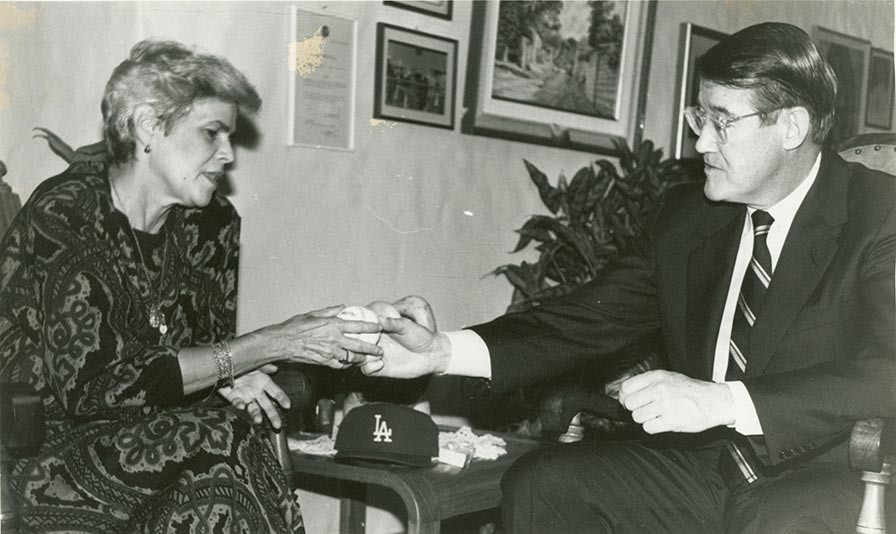
On October 31, 1990, Dodger President Peter O’Malley (right) meets with Violeta Barrios de Chamorro, President of Nicaragua (left) and presents her with a Dodger cap and baseball. O’Malley is in Managua as a special guest of the Nicaraguan Sports Institute, led by Vice Minister Carlos Garcia. O’Malley had lunch with the Mayor of Managua, Dr. Arnoldo Aleman, who succeeded Mrs. Chamorro as Nicaragua President in 1997. The friendship continued and O’Malley privately built a baseball field for the youth of Nicaragua.
From October 30-November 2, 1990, O’Malley made a trip to Managua as a guest of the Nicaraguan Sports Institute where Garcia, now back in his home country with the new regime, was Vice Minister. It was the first visit to Nicaragua by a Major League Baseball official in 20 years. The Orange County Register, October 30, 1990 O’Malley met with Nicaraguan President Violeta Chamorro and Minister of Sports Sucre Frech, a legendary sports broadcaster. O’Malley had lunch with the Mayor of Nicaragua Dr. Arnoldo Aleman, who seven years later would become the country’s 81st President. President Chamorro and Garcia wanted to help youth baseball thrive and build a field for that purpose.
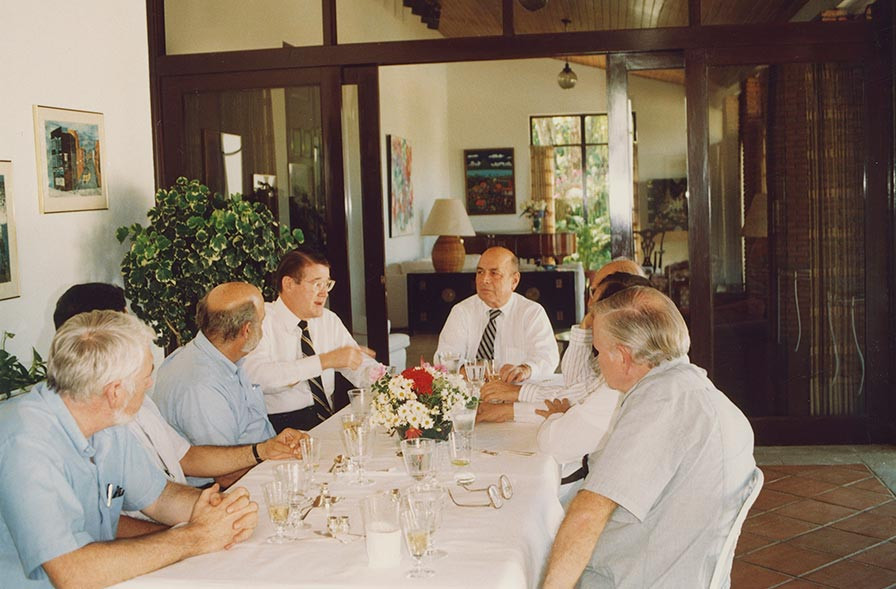
Peter O’Malley (left of center) sits next to Harry W. Shlaudeman, U.S. Ambassador to Nicaragua (head of table) on November 1, 1990 at a private luncheon at the Ambassador’s residence in Managua. Shlaudeman previously served as U.S. Ambassador to Brazil, Argentina, Peru and Venezuela in his lengthy career as an American diplomat.
On November 1, 1990 O’Malley attended a private lunch meeting hosted by Harry W. Shlaudeman, U.S. Ambassador to Nicaragua at his residence. That evening, O’Malley was invited to participate in the opening ceremony for the Nicaraguan Senior Baseball league at National Stadium, where President Chamorro threw the ceremonial first pitch and O’Malley was the batter. Nicaragua’s favorite son Dennis Martinez, Montreal Expos pitcher, was catcher.
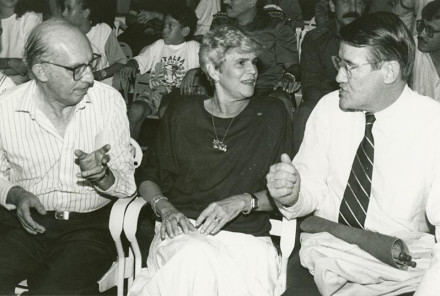
On November 1, 1990, Dodger President Peter O’Malley (right) is a guest of Nicaragua President Violeta Barrios de Chamorro (center) and the country’s Minister of Sports Sucre Frech (left). O’Malley was the first Major League Baseball official in 20 years to visit Nicaragua. He attended the opening of the Nicaraguan Senior Baseball at the National Stadium.
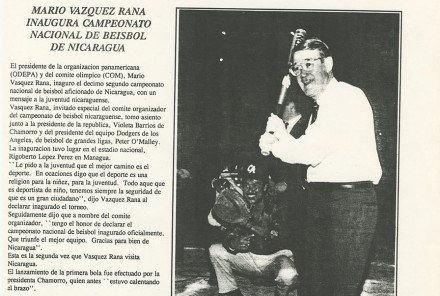
An article in Miami Sports from November 8-14, 1990 shows Dodger President Peter O’Malley holding a bat as Montreal Expos pitcher Dennis Martinez plays catcher, during the opening ceremonies of the 12th National Nicaragua Baseball Championship tournament on November 1, 1990. The first pitch was thrown by Nicaragua President Violeta Barrios de Chamorro.
Akihiro “Ike” Ikuhara, longtime assistant to the Dodger president who accompanied O’Malley on the trip, recalled, “Peter was thinking out loud and he said, ‘We really need to do something to help them.’ And I told him, ‘Peter, every time you leave the country you spend money!’ Peter always says to me that the Dodgers are his business, so he has to make money at that. But amateur baseball is his hobby. He wants to help baseball worldwide. And in a hobby, you spend money.” Maryann Hudson, Los Angeles Times, July 10, 1991 O’Malley was all in.
O’Malley said: “Carlos Garcia, businessman in Managua, Nicaragua was a true pioneer in international baseball. He led the Federacion Mundial de Beisbol Amateur (FEMBA) in 1975 and when I met him I was very impressed with his knowledge about Major League Baseball and his passion to spread baseball around the world. We became good friends and he frequently visited me in Los Angeles and Dodgertown, Vero Beach, Florida. We also worked together in various meetings around the world encouraging the IOC to officially recognize baseball as an Olympic sport.
“I offered to help him supporting youth baseball in Nicaragua and build Dodgers Little League Friendship Field in Managua in 1992. I also learned about Major League pitcher Dennis Martinez who was from Nicaragua and I wanted to enhance the Dodgers’ reputation in that country with hopes we would sign the next Dennis Martinez. In 1980, Carlos was accused by the Sandinista government of being pro-American and imprisoned for four and a half years. Several of us worked hard to obtain his release and eventually he was released from prison late in 1984 and we kept in touch. Carlos deserves the credit for my interest in baseball in Nicaragua.”
O’Malley paid for stadium construction, which would be owned and maintained by Nicaragua, plus he donated needed baseball equipment. He said about Garcia, “We have been friends for many years and I have a lot of affection and admiration for what we are doing and happy to give to the youth. The Dodgers and Nicaragua are very good friends and our assistance won’t end with this stadium. We will continue collaborating with everything that refers to baseball. The Nicaraguan coaches will always be welcome at (Dodgertown) the training camp of the Dodgers in Vero Beach, FL.” Barricada, January 20, 1992
On January 28, 1991, Minister of Sports Frech suddenly passed away, and President Chamorro named Garcia as Minister of Sports. Garcia and four coaches from Nicaragua were welcomed by O’Malley to Dodgertown in 1991 during Dodger Spring Training. The Nicaraguan national team uniform took on the styling of the Dodger script in honor of the Dodgers. “That is to honor the organization that has sent us baseballs, gloves, and had four of our coaches as their guests in spring training this year,” said Garcia. Phil Hersh, Chicago Tribune, August 5, 1991
In May, 1991, Nicaraguan President Chamorro visited Los Angeles to speak to the Los Angeles World Affairs Council, at a lunch in her honor with 500 community leaders in attendance. According to the Los Angeles Times, “She met with business leaders at breakfast, including Dodger President Peter O’Malley, who said the Dodgers will build a youth baseball field in Managua later this year. ‘It was a great baseball country’ before the Sandinistas, he said, ‘and it can be again.’” Patt Morrison, Los Angeles Times, May 10, 1991
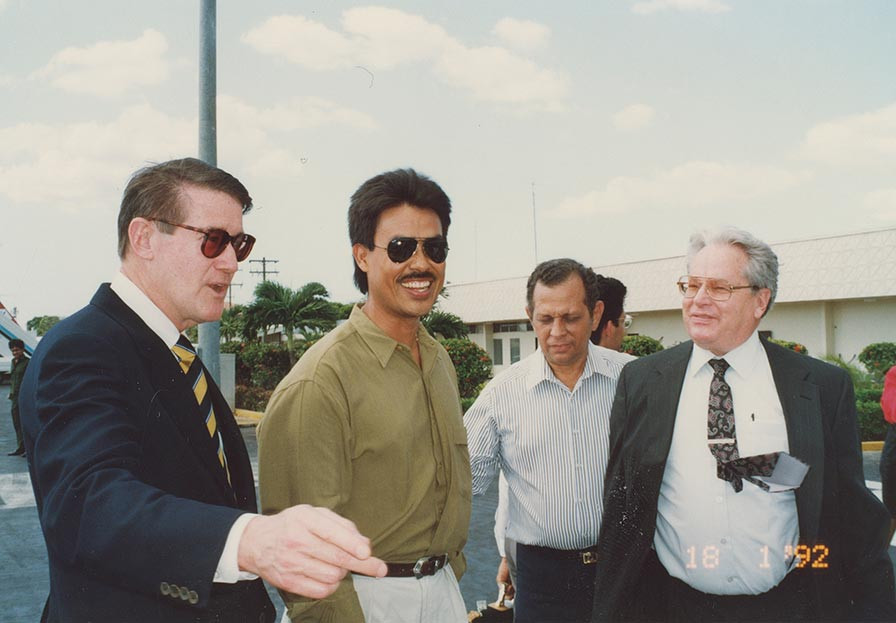
(L-R): Dodger President Peter O’Malley; Montreal Expos pitcher Dennis Martinez; Carlos Garcia, Nicaragua Minister of Sports; and Dr. Creighton Hale, President and CEO, Little League Baseball. Arrival at Managua, Nicaragua Airport for January 18, 1992 dedication ceremonies of “Dodgers Little League Friendship Field,” privately built by Peter O’Malley for the youth of Nicaragua.
Everyone was in a celebratory mood on January 18, 1992. The new Dodgers Little League Friendship Field in Managua was ready to officially open “on the grounds of the former (Anastasio) Somoza mansion.” “Baseball Without Borders: The International Pastime,” George Gmelch, University of Nebraska Press, 2006 The small stadium, also known in Spanish as “Amistad Dodgers,” had been painted light blue and blue out of respect for O’Malley and in honor of the Dodgers, with grandstand seating for 3,000, as well as a press box, three elevated booths, a manual scoreboard, and restrooms.
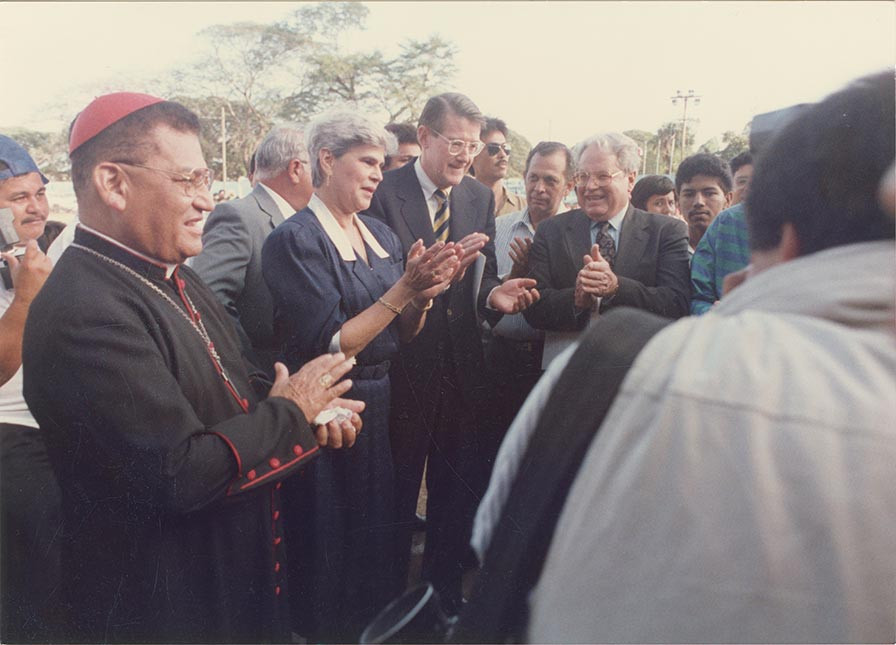
(L-R): Nicaraguan Cardinal Miguel Obando y Bravo; Nicaragua President Violeta Barrios de Chamorro; Dodger President Peter O’Malley; Nicaragua Minister of Sports Carlos Garcia; Little League Baseball President and CEO Dr. Creighton Hale. Prior the January 18, 1992 dedication ceremonies of Dodgers Little League Friendship Field in Managua, President Chamorro, Cardinal Obando, Dr. Hale and O’Malley are in the outfield swarmed by media. O’Malley privately built the baseball field to assist the development of baseball in Nicaragua and to give a special place for the youth of the country to gather and play.
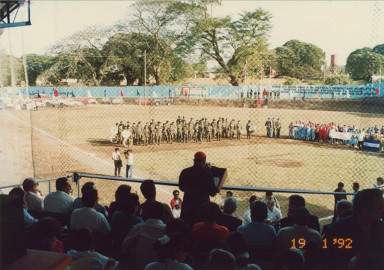
Nicaraguan Cardinal Miguel Obando y Bravo is behind a podium at center addressing the crowd gathered for the dedication ceremonies of Dodgers Little League Friendship Field (also known as Amistad Dodgers) in Managua, Nicaragua on January 18, 1992. Peter O’Malley privately built the 3,000-seat field which was painted blue in honor of the Dodgers. Cardinal Miguel Obando was appointed by Pope John Paul II in 1985. The Cardinal was appointed as Archbishop of Managua in 1970 and served for 35 years. He was the first Nicaraguan Cardinal in the history of the Church.
Joining O’Malley for the dedication ceremonies were Nicaraguan President Chamorro; Minister of Sports Garcia; U.S. Ambassador to Nicaragua Shlaudeman; Little League Baseball President Dr. Creighton Hale; O’Malley assistant Ikuhara; Dodger Vice President, Campo Las Palmas Ralph Avila; and Expos pitcher Dennis Martinez, who on July 28, 1991 threw the major league’s 13th perfect game against the Dodgers at Dodger Stadium. Cardinal Miguel Obando y Bravo, the Archbishop of Nicaragua, attended and greeted children, while praising the building of the baseball field. Cardinal Obando dedicated the park and said, “Sports is a universal institution, as ancient as man himself, although the form of practice has changed through the years…There is nothing like sports to strengthen the soul. I bless this work and all those present.” El Nuevo Diario, January 19, 1992
President Chamorro addressed the crowd, “Part of the dream of my government – to watch over the safe development of our youth – is being realized with the inauguration of this stadium.” La Opinion, January 19, 1992 She said, “I am grateful to all these people who made the effort to help Nicaragua. This commits us to continue working with the children of this country to keep them away from drugs and the streets.” Barricada, January 19, 1992
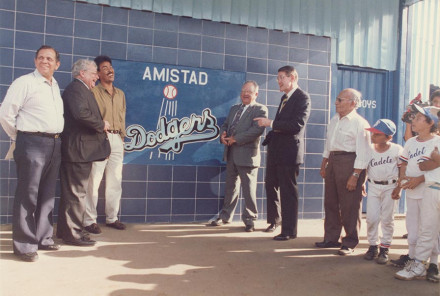
(L-R): Carlos Garcia, Minister of Sports, Nicaragua; Dr. Creighton Hale, President and CEO, Little League Baseball; Nicaragua native and Montreal Expos pitcher Dennis Martinez; Ralph Avila, Dodger Vice President, Campo Las Palmas, Dominican Republic; Peter O’Malley, President, Los Angeles Dodgers; and a local youth baseball team. O’Malley and friends celebrate the Grand Opening of Dodgers Little League Friendship Field (also known as Amistad Dodgers) in Managua, Nicaragua on January 18, 1992. O’Malley privately built the 3,000-seat field.
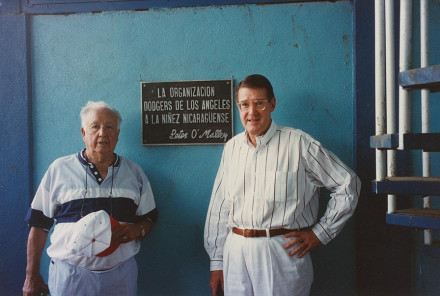
Peter O’Malley privately built Dodgers Little League Friendship Field in Managua, Nicaragua which opened January 18, 1992. Rod Dedeaux (left), legendary University of Southern California head baseball coach, and O’Malley are next to the bronze dedication plaque at the field commemorating O’Malley’s gift to the youth of Nicaragua.
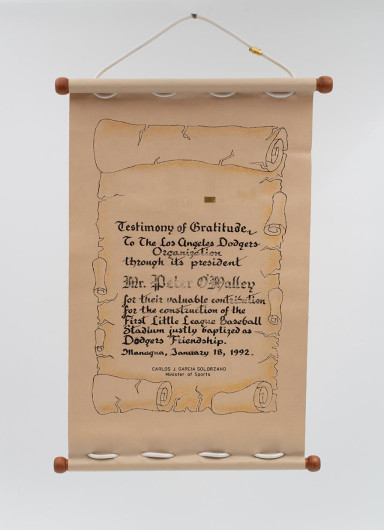
Carlos Garcia, Minister of Sports in Nicaragua, presented this scroll of appreciation to Dodger President Peter O’Malley on January 18, 1992 upon the opening of Dodgers Little League Friendship Field in Managua, Nicaragua. O’Malley privately built the baseball field because of his longtime friendship with Garcia and the desire to assist with youth baseball in Nicaragua. The field seated 3,000 and was painted blue out of respect for O’Malley and the Dodgers. On the field’s dedication, Nicaragua President Violeta Barrios de Chamorro participated in the ceremony.
Garcia said at the opening of the field, “Through Mr. O’Malley we received a donation. And I have the pleasure of presenting Mr. O’Malley with a detailed report of the expenses and receipts of the utilization of his donation, together with our most sportsmanship and fraternal gratitude for this unquestionable show of friendship which benefits our children! I want to express that beginning next week a Baseball Academy will function in this Stadium which will provide technical, theoric, and civic training to approximately 600 boys and girls between the ages of 7 to 12 years in courses of five weeks duration.”
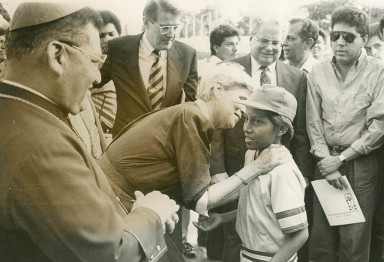
Nicaragua President Violeta Barrios de Chamorro greats a young baseball player at the dedication ceremonies for Dodgers Little League Friendship Field in Managua, Nicaragua on January 18, 1992, as Cardinal Miguel Obando y Bravo from Nicaragua (far left) looks on. Behind President Chamorro is Dodger President Peter O’Malley who privately built the youth baseball field which seats 3,000. To O’Malley’s side is Dr. Creighton Hale, President and CEO, Little League Baseball, a frequent international traveling friend. Mrs. Chamorro served as President of Nicaragua from 1990 to 1997 and is the only woman president in her country’s history. She is the recipient of many awards around the world for contributing peace and leadership.
Little League Baseball President Dr. Hale said at the dedication, “No Major League Baseball organization has been more supportive of Little League Baseball than the Los Angeles Dodgers and their President Mr. Peter O’Malley. The Dodgers Little League Friendship Field in Nicaragua is the most recent example of the Dodgers’ firm commitment to promoting the value of Little League Baseball participation in the international arena and we are very grateful for this support.” Media Release, Little League Baseball, January 13, 1992
On February 7, 1992, United States Senator Nancy Kassebaum of Kansas, stated on the floor of the Senate with Senate President Dan Quayle presiding and was chronicled in the Congressional Record, “On January 18, the owner of the Los Angeles Dodgers, Mr. Peter O’Malley, joined Nicaraguan President Violeta Chamorro in opening the Dodgers Little League Baseball Friendship Field in Managua, Nicaragua. Built with the support of the Dodgers, this field will give thousands of Nicaraguan youngsters an opportunity to play Little League Baseball.
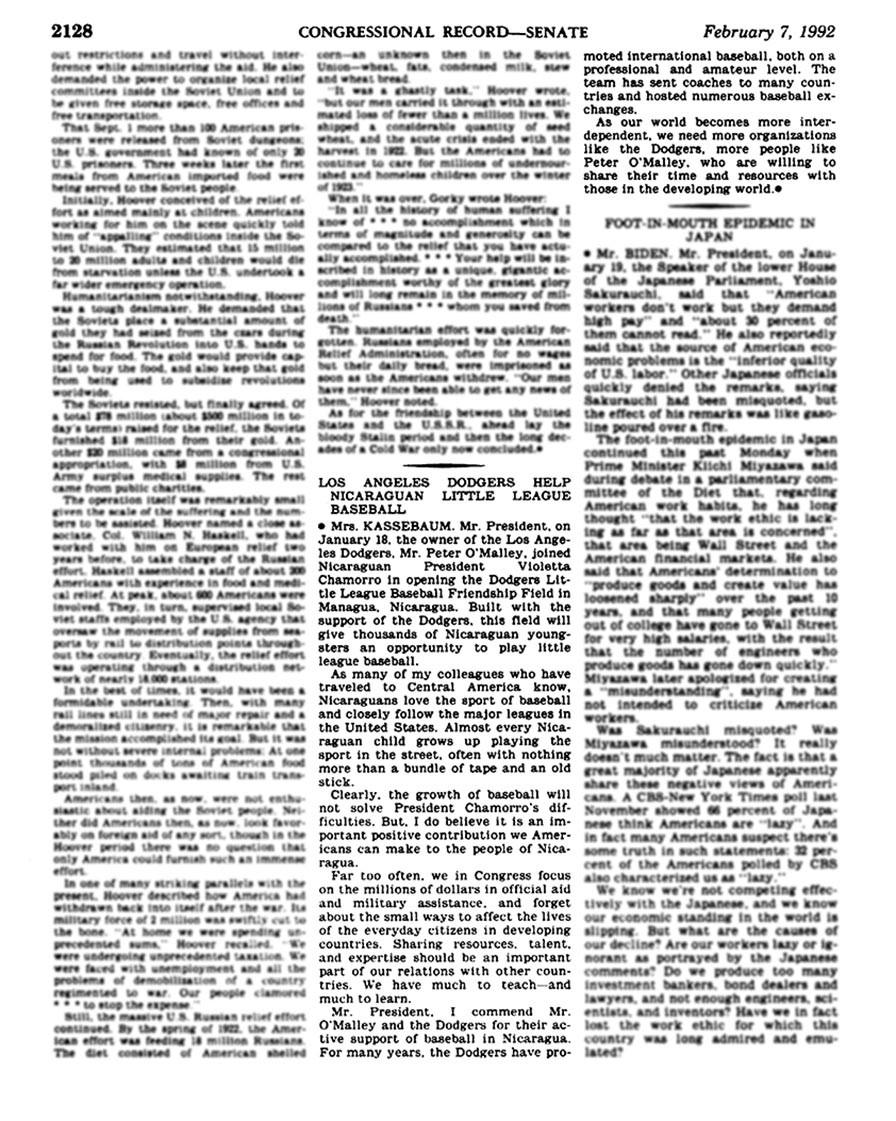
“As many of my colleagues who have traveled to Central America know, Nicaraguans love the sport of baseball and closely follow the major leagues in the United States. Almost every Nicaraguan child grows up with nothing more than a bundle of tape and an old stick. Clearly, the growth of baseball will not solve President Chamorro’s difficulties. But, I do believe it is an important positive contribution we Americans can make to the people of Nicaragua.
“Far too often, we in Congress focus on the millions of dollars in official aid and military assistance, and forget the small ways to affect the lives of the everyday citizens in developing countries. Sharing resources, talent, and expertise should be an important part of our relations with other countries. We have much to teach – and much to learn.
“Mr. President, I commend Mr. O’Malley and the Dodgers for their active support of baseball in Nicaragua. For many years, the Dodgers have promoted international baseball, both on a professional and amateur level. The team has sent coaches to many countries and hosted numerous baseball exchanges. As our world becomes more interdependent, we need more organizations like the Dodgers, more people like Peter O’Malley, who are willing to share their time and resources with those in the developing world.” Congressional Record, Vol. 138, No. 15, February 7, 1992
Senator Kassebaum was the first woman to represent Kansas in the Senate and served from December 23, 1978 to January 3, 1997.
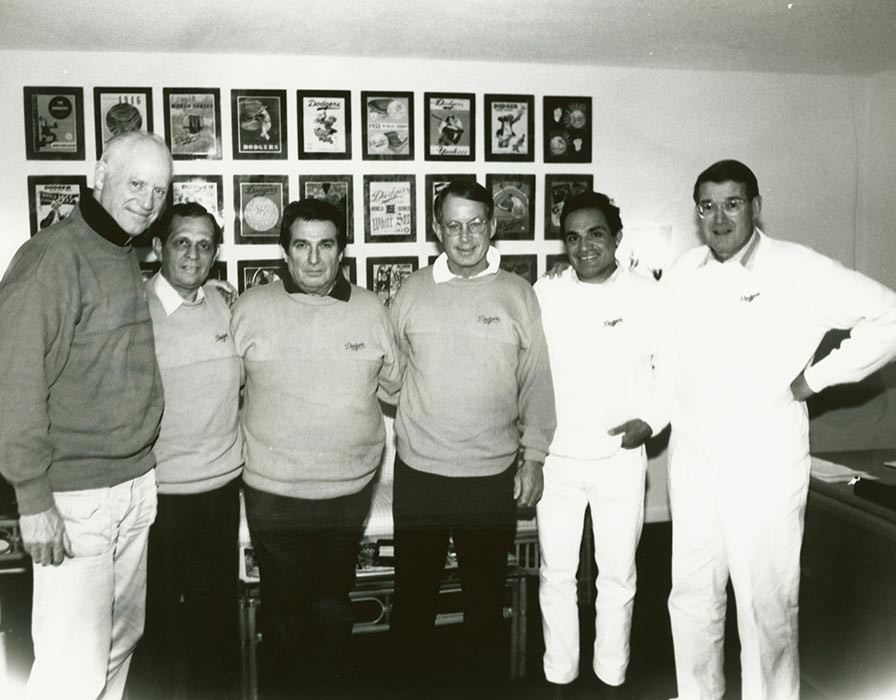
(L-R): Former Baseball Commissioner Bowie Kuhn; Carlos Garcia, President of Nicaraguan Baseball and Minister of Sports, Nicaragua; Aldo Notari, President, International Baseball Association (IBA), third Vice President, from Italy; Dr. Bob Smith, President, IBA from Greenville College (IL); Alonso Perez, President of Mexican Baseball Federation; and Peter O’Malley, Dodger President. On March 15, 1993 at Peter O’Malley’s office in Dodgertown, Vero Beach, Florida, Notari, Garcia and Perez were all vying for the IBA presidency to succeed Dr. Bob Smith. Notari was eventually elected that year and moved the IBA headquarters to Lausanne, Switzerland and renamed the IBA, the International Baseball Federation (IBAF).
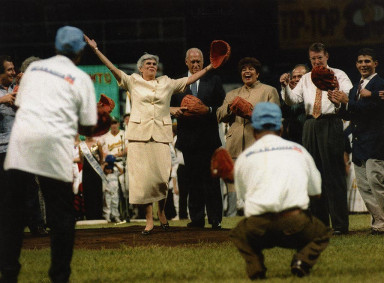
(L-R): Aldo Notari, President, International Baseball Association (IBA); Violeta Barrios de Chamorro, President, Nicaragua; Joao Havelange, FIFA President; Mrs. Roberto (Vera) Clemente; and Dodger President Peter O’Malley. On August 3, 1994, Mrs. Chamorro, President of Nicaragua, throws the ceremonial first pitch at the XXXII Amateur World Baseball Championship Opening Ceremonies at National Stadium in Managua, Nicaragua. Accompanying Chamorro to the field was O’Malley.
On March 15, 1993, Garcia was at Dodgertown, Vero Beach, Florida to attend meetings at O’Malley’s office, along with IBA President Dr. Bob Smith, former Baseball Commissioner Bowie Kuhn, Aldo Notari from Italy, and Alonso Perez from Mexico. Garcia, Notari and Perez were all vying for the IBA presidency later that year to succeed Dr. Smith. Notari was eventually elected president and served for the next 13 years. Garcia returned to Dodgertown as O’Malley’s guest on March 17, 1994. He was always welcome during Dodger Spring Training and he was there on a regular basis. On August 2, 1994, O’Malley returned to Managua for the 32nd Amateur World Baseball Championships. While there, O’Malley was inducted into the Nicaraguan Sports Hall of Fame, with ceremonies conducted by Nicaraguan President Chamorro. Garcia founded the Nicaraguan Sports Hall of Fame that year. Other inductees in O’Malley’s inaugural class were Dr. Bob Smith, longtime president of the International Baseball Association, Aldo Notari, President of the IBA from Italy, and star pitcher Dennis Martinez, one of 15 Nicaraguans to have played in Major League Baseball (as of 2024).
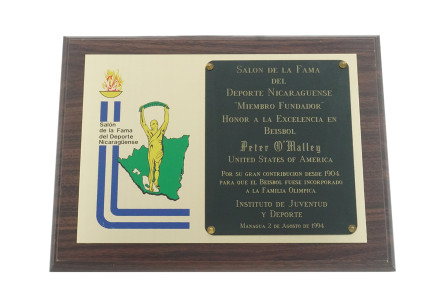
August 2, 1994, a plaque from the Nicaraguan Sports Hall of Fame to honor Peter O’Malley for his contributions to supporting baseball for youth in Nicaragua and for his advocacy of baseball in the Olympic family.
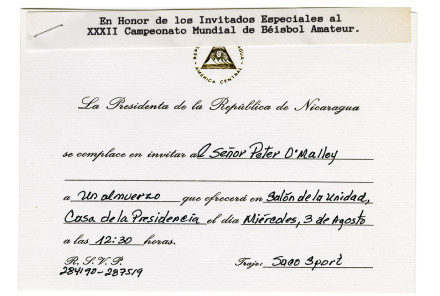
Violeta Barrios de Chamorro, President of Nicaragua, sends this invitation to Dodger President Peter O’Malley for a private luncheon on August 3, 1994, recognizing honorees of the Nicaraguan Sports Hall of Fame. The luncheon is at President Chamorro’s residence.
In 2008, Garcia was named Secretary General for the Nicaragua Olympic Committee. He passed six years later at age 83.
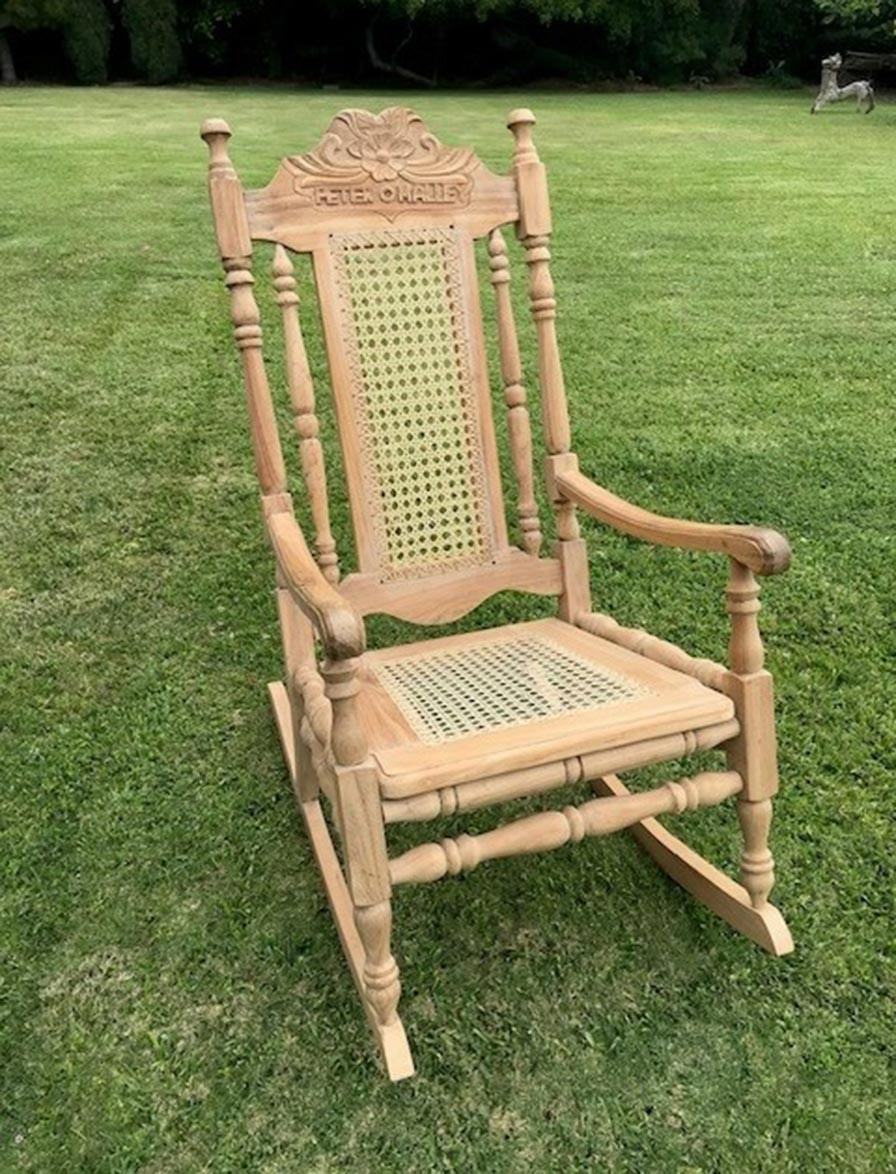
In appreciation of their longtime friendship, Carlos Garcia brought this hand-crafted wooden rocking chair from Nicaragua as a gift to Dodger President Peter O’Malley at Dodgertown, Vero Beach, Florida. International baseball leader Garcia had “Peter O’Malley” carved into the top of the chair.
Former major league pitcher JC Ramirez, born in Managua, fondly recalled in 2019, “I did play at Amistad Dodgers when I was younger. I played a lot of tournaments over in that baseball field!” Right-hander Ramirez played with five major league teams, including the Los Angeles Angels (2016-2019), where he won a career-best 11 games in 2017.
Thirty years later, the Dodgers Little League Friendship Field privately built by O’Malley is still part of the Sports Complex of the Nicaraguan Institute of Youth and Sports. Es.m.wikipedia.org, Carlos Garcia Solorzano, 2020

